Table of Contents
Chapter 6

Understanding Our Criminal Justice System

When we see someone violating the law, we immediately think of informing the police. You might have seen, either in real life or in the movies, police officers filing reports and arresting persons. Because of the role played by the police in arresting persons, we often get confused and think that it is the police who decide whether a person is uilty or not. This, however, is far from true. After a person is arrested, it is a court of law that decides whether the accused person is guilty or not. According to the Constitution, every individual charged of a crime has to be given a fair trial.
Do you know what it means to get a fair trial? Have you heard of an FIR? Or, do you know who a public prosecutor is? In this chapter, we use a fictional case of theft to try and highlight the process as well as the role of different individuals in the criminal justice system. Most cases go through a process that is similar to the one discussed in our fictional case. Therefore, understanding these processes as well as the role that different persons should play within the criminal justice system is crucial, so that if ever the occasion should arise, you are aware of the processes that should be followed.
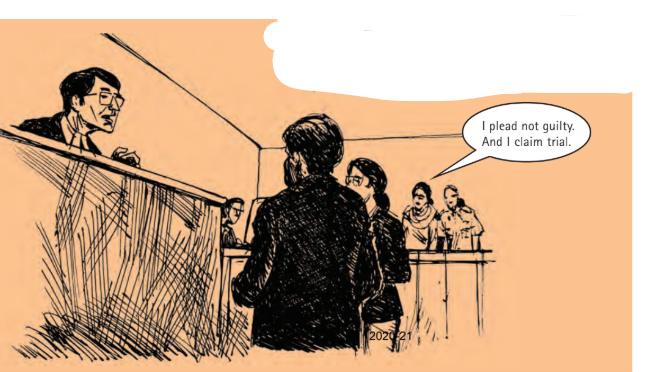
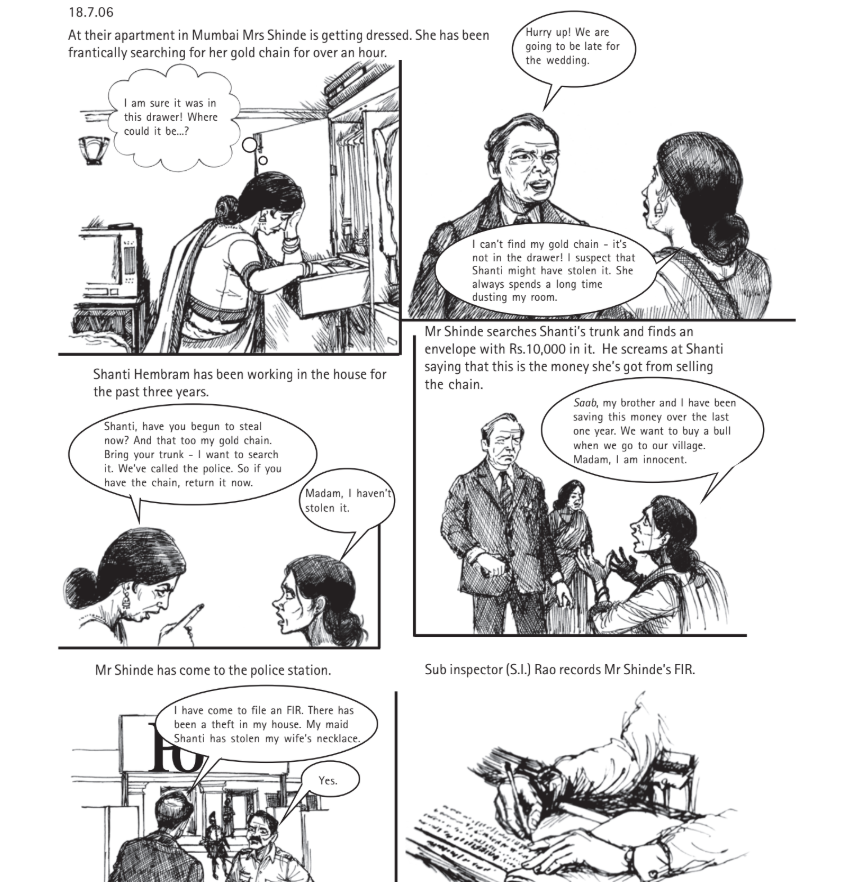
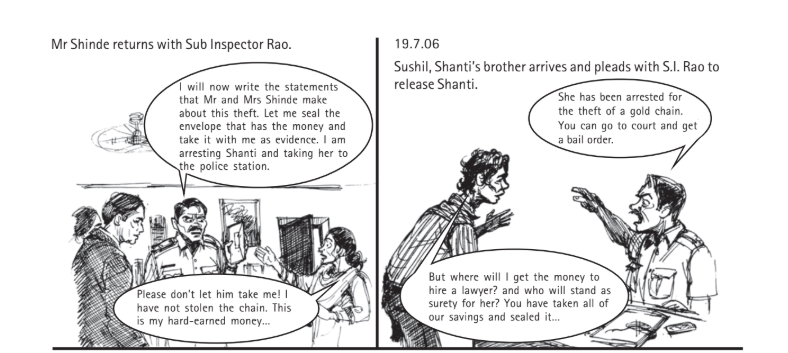
23.8.06
Although the court granted bail to Shanti after a month, she was unable to get anyone to stand surety for her for Rs 20,000. She, therefore, continued to be in jail. She is very traumatised. She is worried about what will happen during the trial.
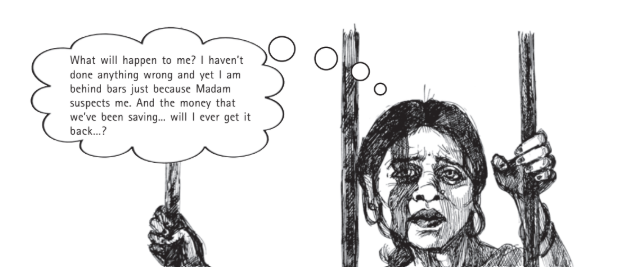

14.9.06
The police files a chargesheet in the Magistrate’s Court. The court gives a copy of the chargesheet including statements of witnesses to Shanti. Shanti tells the court that she has no lawyer to defend her against this false case of theft.
The Magistrate appoints Advocate Kamla Roy as Shanti’s defence lawyer at the government’s expense.
According to Article 22 of the Constitution, every person has a Fundamental Right to be defended by a lawyer. Article 39A of the Constitution places a duty upon the State to provide a lawyer to any citizen who is unable to engage one due to poverty or other disability.
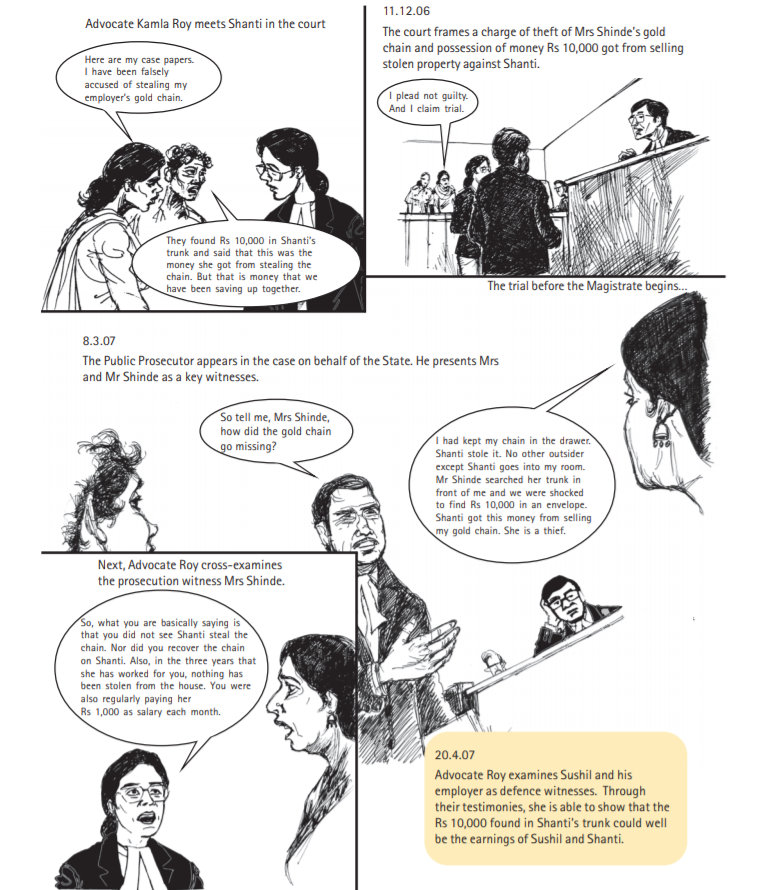
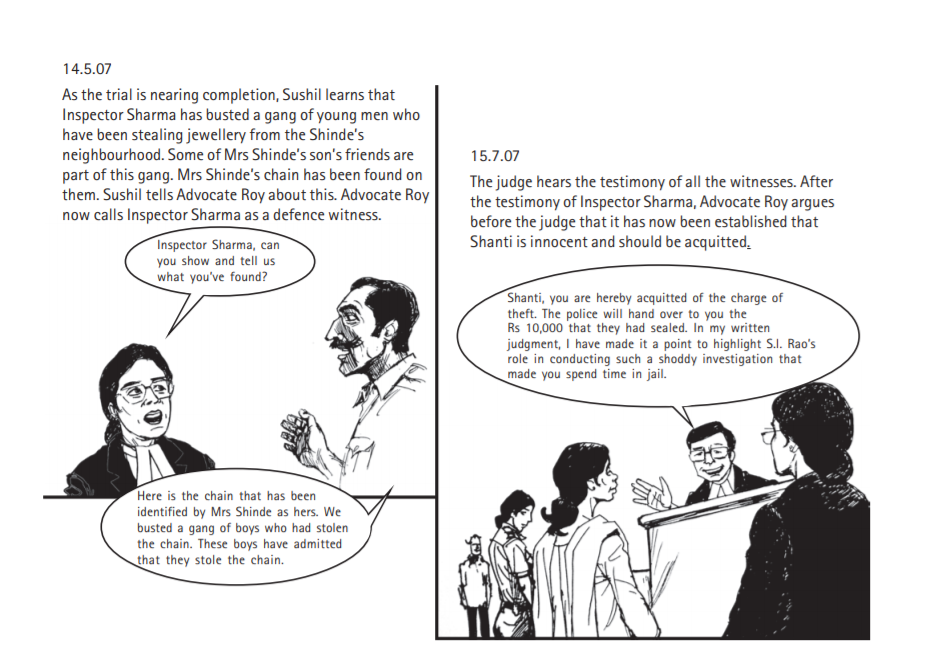
From the above incident, you can see that the four key players in the criminal justice system are the police, the Public Prosecutor, the defence lawyer and the judge. You have seen the roles each of them played in the above case. Now let us try and understand their roles more generally.
What is the Role of the Police in Investigating a Crime
One important function of the police is to investigate any complaint about the commission of a crime. An investigation includes recording statements of witnesses and collecting different kinds of evidence. On the basis of the investigation, the police are required to form an opinion. If the police think that the evidence points to the guilt of the accused person, then they file a chargesheet in the court. As stated at the beginning of this chapter, it is not the job of the police to decide whether a person is guilty or innocent, that is for the judge to decide.
You read in Unit 2 about the rule of law, which means that everyone is subject to the law of the land. This includes the police. Therefore, police investigations always have to be conducted in accordance with law and with full respect for human rights. The Supreme Court has laid down guidelines that the police must follow at the time of arrest, detention and interrogation. The police are not allowed to torture or beat or shoot anyone during investigation. They cannot inflict any form of punishment on a person even for petty offences.
Article 22 of the Constitution and criminal law guarantee to every arrested person the following Fundamental Rights:
• The Right to be informed at the time of arrest of the offence for which the person is being arrested.
• The Right to be presented before a magistrate within 24 hours of arrest.
• The Right not to be ill treated or tortured during arrest or in custody.
• Confessions made in police custody cannot be used as evidence against the accused.
• A boy under 15 years of age and women cannot be called to the police station only for questioning.
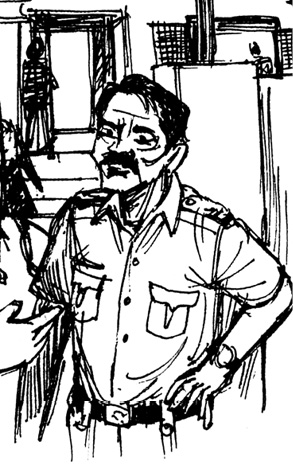
Why do you think there is a rule that confessions made during police custody cannot be used as evidence against the accused?
The Supreme Court of India has laid down specific requirements and procedures that the police and other agencies have to follow for the arrest, detention and interrogation of any person. These are known as the D.K. Basu Guidelines and some of these include:
• The police officials who carry out the arrest or interrogation should wear clear, accurate and visible identification and name tags with their designations;
• A memo of arrest should be prepared at the time of arrest and should include the time and date of arrest. It should also be attested by at least one witness who could include a family member of the person arrested. The arrest memo should be counter-signed by the person arrested.
• The person arrested, detained or being interrogated has a right to inform a relative, friend or well-wisher.
• When a friend or relative lives outside the district, the time, place of arrest and venue of custody must be notified by police within 8 to 12 hours after arrest.
1. Now let us return to the story of Shanti and answer the following questions:
a) When Shanti was arrested for theft, S.I. Rao also kept her brother Sushil in the police lock up for two days. Was it legal for the police to detain him? Does it violate the D.K. Basu guidelines?
b) Did S.I. Rao do enough to question witnesses and compile evidence before arresting Shanti and filing a case against her? In keeping with the duties of the police as stated above, what else do you think S.I. Rao could have done as part of his investigation?
2. Now let us take a slightly different scenario. Shanti and her brother Sushil go to the police station to complain that Mr Shinde’s 20-year old son had stolen Rs 15,000 that they had been saving up. Do you think that the officer in charge of the Police Station will promptly lodge an FIR? List a few factors that in your opinion may influence the decision of the police to register or not register an FIR.
First Information Report (FIR):
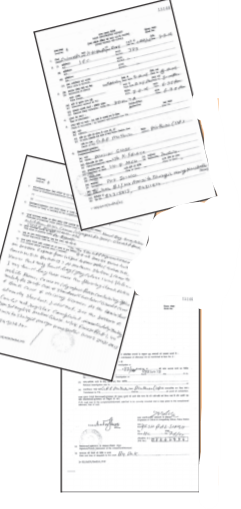
It is with the registration of an FIR that the police can begin their investigations into a crime. The law states that it is compulsory for an officer in charge of a police station to register an FIR whenever a person gives information about a cognizable offence. This information can be given to the police either orally or in writing. The FIR usually mentions the date, time and place of the offence, details the basic facts of the offence, including a description of the events. If known, the identity of the accused persons and witnesses is also mentioned. The FIR also states the name and address of the complainant. There is a prescribed form in which the police registers an FIR and it is signed by the complainant. The complainant also has a legal right to get a free copy of the FIR from the police.
What is the Role of the Public Prosecutor?
A criminal offence is regarded as a public wrong. What is meant by this is that it is considered to have been committed not only against the affected victims but against society as a whole. Do you remember the case of the dowry death of Sudha that we read about in the previous chapter? The case against the accused Laxman and his family was presented by the State. That is why the case was called State (Delhi Administration) vs Laxman Kumar and Others. Similarly the above case can be called ‘State vs Shanti Hembram’ and not Mrs Shinde vs Shanti Hembram.
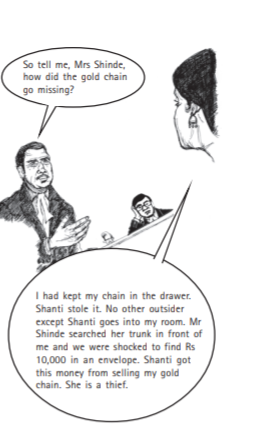
In court, it is the Public Prosecutor who represents the interests of the State. The role of the Prosecutor begins once the police has conducted the investigation and filed the chargesheet in the court. He/she has no role to play in the investigation. The Prosecutor must conduct the prosecution on behalf of the State. As an officer of the court, it is his/her duty to act impartially and present the full and material facts, witnesses and evidence before the court to enable the court to decide the case.
What is the Role of the Judge?
The judge is like an umpire in a game and conducts the trial impartially and in an open court. The judge hears all the witnesses and any other evidence presented by the prosecution and the defence. The judge decides whether the accused person is guilty or innocent on the basis of the evidence presented and in accordance with the law. If the accused is convicted, then the judge pronounces the sentence. He may send the person to jail or impose a fine or both, depending on what the law prescribes.
What did the judge say in Shanti’s case after hearing the testimony of all the witnesses?
What is a Fair Trial?
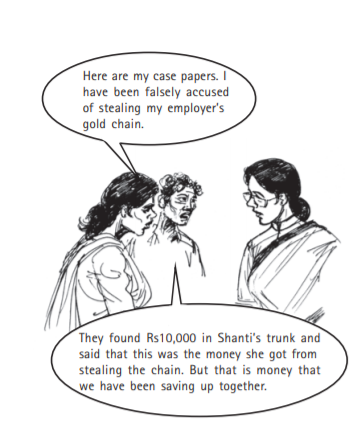
Firstly, Shanti was given a copy of the chargesheet and all other evidence that the prosecution presented against her. Shanti was charged with the offence of theft that was defined as a crime in the law. The trial was held in an open court, in public view. Her brother, Sushil could attend the court hearings. The trial was held in the presence of the accused. Shanti was defended by a lawyer. Shanti’s lawyer, Advocate Roy was given an opportunity to cross-examine all the prosecution witnesses. Advocate Roy was given an opportunity to present witnesses in Shanti’s defence.
Although the police filed a case of theft against Shanti, the judge assumed her to be innocent. It was the responsibility of the prosecution to prove beyond reasonable doubt that Shanti was guilty. In this case the prosecution failed to do so.
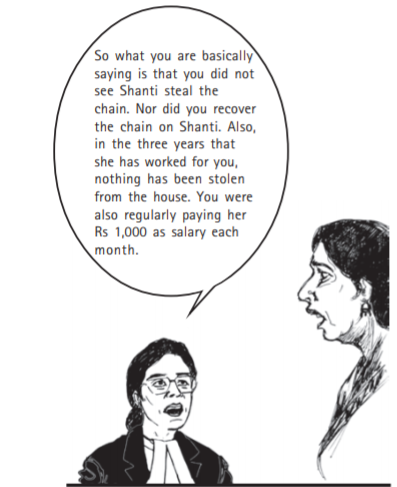
The Constitution and the law both state that all of the persons that we have discussed in this chapter should carry out their roles in a proper manner. What this means is that they all need to work to ensure that every citizen, irrespective of their class, caste, gender, religious and ideological backgrounds gets a fair trial when accused. The rule of law which says that everyone is equal before the law would not make much sense if every citizen were not guaranteed a fair trial by the Constitution.
All of the processes, written in bold on page 74, are crucial to a fair trial. Write in your own words what you understand of the following processes based on the above description of Shanti’s case.
a. Open Court:
b. Basis of Evidence:
c. Cross-examination of Prosecution Witnesses:
Discuss in class what might have happened in Shanti’s case if the following procedures had not been observed.
a. If she were not defended by a lawyer.
b. If the court had not assumed her to be innocent.
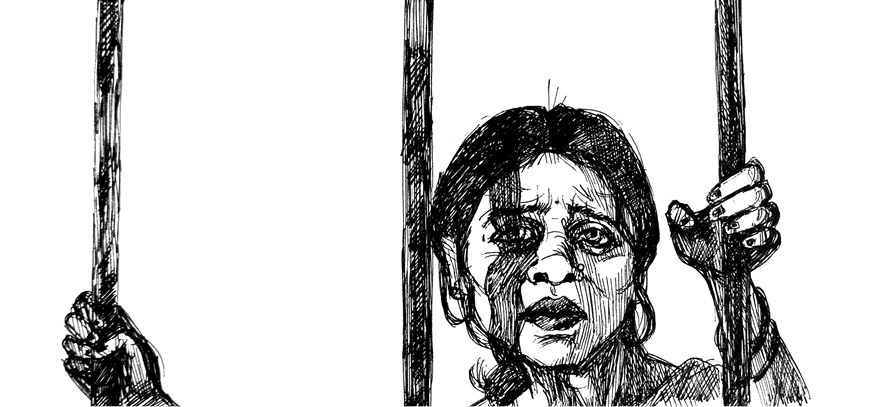
Exercises
In a town called Peace Land, the supporters of the Fiesta football team learn that the supporters of the Jubilee football team in the nearby city about 40 km away have damaged the ground on which the Final between both teams is to be held the following day. A crowd of Fiesta fans armed with deadly weapons attacks the homes of the supporters of the Jubilee football team in the town. In the attack, 10 men are killed, 5 women are gravely hurt, many homes are destroyed and over 50 people injured.
Imagine that you and your classmates are now part of the criminal justice system. First divide the class into the following four groups of persons:
1. Police 2. Public Prosecutor 3. Defence lawyer 4. Judge
The column on the right provides a list of functions. Match these with the roles that are listed on the left. Have each group pick the functions that it needs to perform to bring justice to those who were affected by the violence of the Fiesta fans. In what order, will these functions be performed?
| Roles | Functions |
|---|---|
| Police | Hear the witnesses |
| record the statements of witnesses | |
| Public Prosecutor | Cross examine the witnesses |
| take photographs of burnt homes | |
| Defence Lawyer | Record the evidence |
| arrest the Fiesta fans | |
| Judge | Writes the judgment |
| argue the case for the victims | |
| decide for how many years the accused will be put in jail | |
| examine the witnesses in court | |
| pass the judgment | |
| get the assaulted women medically examined | |
| conduct a fair trial | |
| meet the accused persons |
Now take the same situation but ask one student who is a supporter of the Fiesta Club to perform all the functions listed above. Do you think the victims would get justice if only one person performed all of the functions of the criminal justice system? Why not?
State two reasons why you believe that different persons need to play different roles as part of the criminal justice system.

Accused: In the context of this chapter this refers to the person who is tried by a court for a crime.
Cognizable: In the context of this chapter this refers to an offence for which the police may arrest a person without the permission of the court.
Cross-examine: In the context of this chapter this refers to the questioning of a witness who has already been examined by the opposing side in order to determine the veracity of his/her testimony.
Detention: In the context of this chapter this refers to the act of being kept in illegal custody by the police.
Impartial: The act of being fair or just and not favouring one side over another.
Offence: Any act that the law defines as a crime.
To be charged of a crime: This refers to the trial judge informing the accused, in writing, of the offence for which he/she will face trial.
Witness: In the context of this chapter this refers to the person who is called upon in court to provide a first-hand account of what he/she has seen, heard or knows.